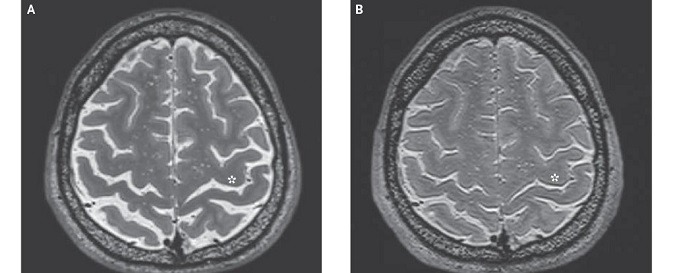Neuroimaging study finds significant changes in brain structure during long-duration space flight

Before (Panel A) and After (Panel B) long term space flight. Credit: The New England Journal of Medicine.
MRI reveals brain changes during space missions (Medical Physics):
“Astronauts living and working in space will experience the detrimental effects of microgravity on the human body. Astronauts aboard the International Space Station, for example, have experienced altered vision and increased pressure inside their heads, symptoms termed as visual impairment intracranial pressure (VIIP) syndrome…“Exposure to the space environment has permanent effects on humans that we simply do not understand,” said Roberts. “What astronauts experience in space must be mitigated to produce safer space travel for the public…”
Roberts concluded that significant changes in brain structure occur during long-duration space flight, and that the parts of the brain that are most affected are the frontal and parietal lobes, which control movement and higher executive function. The longer an astronaut stayed in space, the worse the symptoms of VIIP syndrome would be.”
The Study
Effects of Spaceflight on Astronaut Brain Structure as Indicated on MRI (The New England Journal of Medicine). From the Abstract:
- BACKGROUND: There is limited information regarding the effects of spaceflight on the anatomical configuration of the brain and on cerebrospinal fluid (CSF) spaces.
- METHODS: We used magnetic resonance imaging (MRI) to compare images of 18 astronauts’ brains before and after missions of long duration, involving stays on the International Space Station, and of 16 astronauts’ brains before and after missions of short duration, involving participation in the Space Shuttle Program.
- CONCLUSIONS: Narrowing of the central sulcus, upward shift of the brain, and narrowing of CSF spaces at the vertex occurred frequently and predominantly in astronauts after long-duration flights. Further investigation, including repeated postflight imaging conducted after some time on Earth, is required to determine the duration and clinical significance of these changes.


